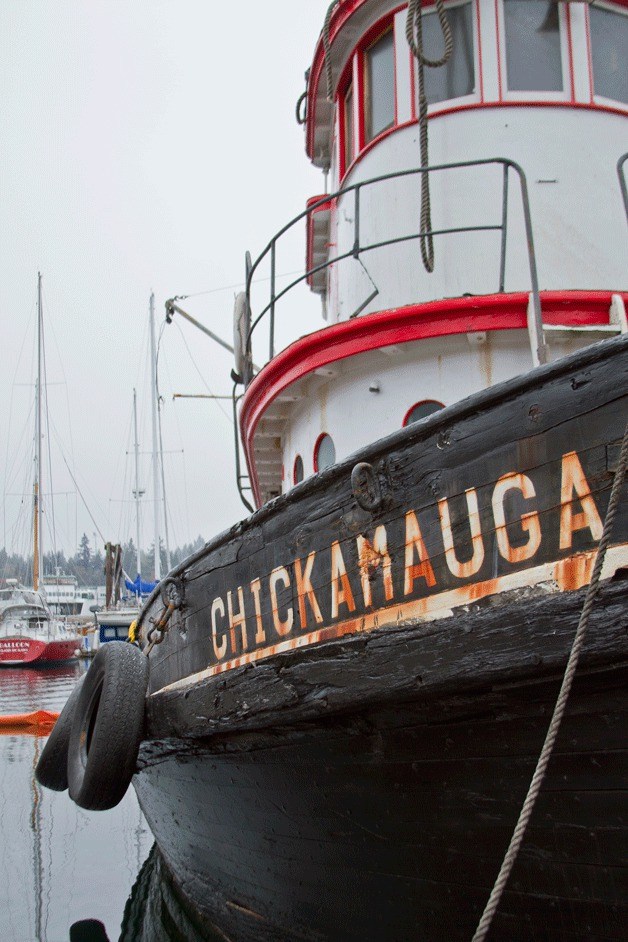The sticky situation surrounding the ownership of the troubled tugboat “Chickamauga” is only getting worse.
The suspected owner of the damaged vessel is now reportedly claiming the boat is the property of his as-yet-unidentified ex-wife.
Authorities have been struggling to identify the actual owner of the nearly century-old tug after it sank in its mooring Oct. 2 at the Eagle Harbor Marina.
The neglected boat leaked oil and fuel into the harbor as it sank and caused a frantic pollution-control effort that involved four different groups of responders and ultimately resulted in a price tag of $150,000 in cleanup costs.
Anthony Smith, who is reportedly currently in Alaska and who has not yet responded to any calls from the marina about his vessel sinking, was confirmed as the owner of the boat by harbormaster Doug Crow.
Crow maintains that inconsistencies in the vessel’s paperwork have now made it impossible to be certain of even the basic fact of the tug’s ownership.
The issue has then been turned over to the marina’s lawyers, Crow said.
“The boat’s documentation expired in 2010,” Crow said.
“The owner, or alleged owner — he claims the boat is owned by his ex-wife. Maybe he’s trying to create a foggy situation so nobody can go after him,” Crow said.
“The only person he’s responded to has been the [state] surveyor,” he said.
A Coast Guard spokesman from the Incident Management Division said the boat is no longer an environmental hazard.
Even so, there remains the question of who exactly is responsible for the money spent on the clean-up effort.
The $150,000 in clean-up costs have been financed by money available through the Oil Spill Liability Trust Fund, which exists for just such incidents and is itself funded through a tax placed on every barrel of oil sold in the country, said Coast Guard spokesman Mike Sarniak.
Due to legal issues surrounding the ownership of the boat, the Coast Guard contractor was unable to move the derelict vessel.
The Eagle Harbor Marina is anxious to have the tug removed.
“Every day I work on that [removal],” Crow said. “Every day I work on that a lot.”
Whether the boat is no longer the property of Smith — or it is and he did not correctly update the vessel’s paperwork — the question of legal ownership is enough to keep the boat stuck where it is and mired in a legal quandary.
“He filled out the information as if he were the owner,” Crow said of Smith. “He said it to me when he came in. In that sense I think he is [the owner].”
“We’ve called him and we’ve emailed him,” Crow added. “We’ve also tried to work with the state, but they are unable to search on their system if he can’t supply them with the [registration] number.”
Vessels are required to be registered with the state but that information does not have to be displayed on the boat itself, according to Crow.
“We’re just hanging in, trying to get a release so we can do something with that tug,” Crow said.
In light of these events, and several other such incidents in the state, the issue of the disposal of abandoned or derelict vessels has become the subject of discussion around Bainbridge.
The Washington State Department of Natural Resources initiated the Derelict Vessel Removal Program to help solve the worsening problem of abandoned boats in and around Washington’s many waterways.
The state maintains a list of problem vessels, organized by vessel identification and general location. The most current version of the list includes at least two boats on Bainbridge Island.
The state said that, as of November 2012, 254 vessels were listed on their state-wide removal list. Kitsap and San Juan counties also have the greatest number of derelict vessels in the state.
According to state officials, derelict and abandoned vessels are becoming increasingly common and can leak pollutants such as oil, diesel, gas and other hazardous substances.
Funding, however, can’t keep up with removal and disposal costs.
According to Crow, the aid offered by the program is not applicable to the current situation with the “Chickamauga.”
“The Derelict Vessel Program money is not available for private marinas,” Crow said. “The only way we would have access to those funds is if a public entity, like the city, agrees to take the boat and they can essentially trump out the owner.”
Crow said a city or other such public entity can take ownership of an apparently derelict vessel in 30 days, while a private marina can not do so for at least 90 days.
Once ownership is usurped, the marina would become responsible for any and all damage and expense caused by the vessel.
“It’s a major problem,” he said.



